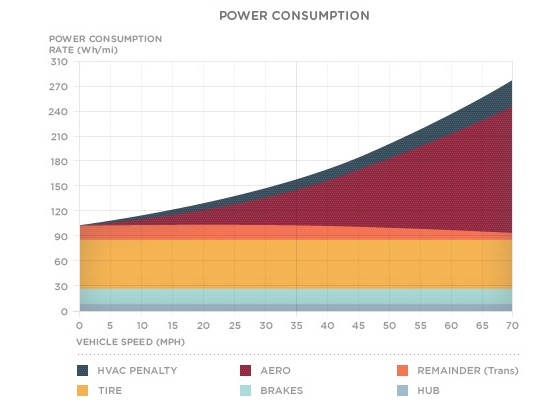Surge
Well-known member
I feel quite strongly about this, so felt it deserved a new thread.
If you opt for the REx, make sure you understand its limitations - and whether or not it fits your driving. The REx is not a solution for all range anxiety. It does not make the i3 a long-distance highway cruiser.
Let's review the relevant facts:
1) EPA rated the BEV (non-REx) i3 at 81 miles
2) The REx is about 20-28% LESS efficient (see my other post from today on this). It breaks down like this:
- REx is 10% heavier, so -10%
- REx drag coefficient is 0.30 instead of 0.29 -- this has the biggest impact on the highway, at 75 mpg you are down another -4.5% in range [recall from high-school physics that the force required to move a car requires speed^3, so with a higher drag coefficient, you get penalized exponentially the faster you travel]
- heat pump - lose about 7%, depending on how cold it is and how much you use the heater
- US/Canada, can't use 6% of battery with REx, so there's another 6% loss in range
Don't forget that this 20-28% loss of efficiency means 20-28% longer charger times!
3) Taking (1) and (2) into account, your EPA range on battery power for the REx is only about 58-65 miles
4) Ok, but I bet many of you are thinking, 'so what', the REx will double my range, so I get over 110 miles in total… right?
Well… not quite!
Not if you need that range for highway driving. And I bet most people don't drive more than ~60 miles per day in the city, so they will count on the REx when on longer trips involving the highway.
So here's where you need to know that at 70-75 mph, the REx won't give you more than around 60-65 miles. I am basing this on owner reviews (some, such as the UK Telegraph review, rate the REx at only 40-50 miles on the highway, even in moderate temperatures).
Even this sounds good - +60 miles on top of the 60 or so you get on battery, what's wrong with 120 miles?!
Well, nothing, if you don't drive in winter!
5) This is the death-blow of the REx, for me… because in below freezing, knowledgable people say that you could lose 40 over 50% of the range. This will affect the REx range as well, and it may affect it even more, because the little gas engine will have to run at the highest rpm possible to keep the battery charged, where it is less efficient than at lower rpms.
So your range is going to be more like 60 miles total - 30 + 30.
But with the BEV, you would get about 40-50 miles (based off the EPA estimate, adjusted for lower outside temp.).
To gain +20 miles and have to carry around a gas engine, and be penalized 20-30% in 100% of your driving.
Is having a safety net of 20 miles worth the extra cost, refueling hassles, and performance reduction worth it to you?
So be aware of what the REx will and won't do. When would the REx make tons of sense?
- if you don't drive on the highway
- if you don't drive in cold (below freezing) temperatures
- if your daily commute/travels are more than 80 miles but less than 120 miles
Finally, at least one member here advocates choosing the option that will work in the worst possible scenario. I respectfully disagree. If we chose all of our possessions for the 0.0001% outcome, we would be living in concrete bunkers.
More realistically, apply the 80-20 rule -- figure out how you do 80% of your driving and plan for that. Don't let the 20% dictate the 80%. (Or choose 90-10, if you feel more comfortable).
If you opt for the REx, make sure you understand its limitations - and whether or not it fits your driving. The REx is not a solution for all range anxiety. It does not make the i3 a long-distance highway cruiser.
Let's review the relevant facts:
1) EPA rated the BEV (non-REx) i3 at 81 miles
2) The REx is about 20-28% LESS efficient (see my other post from today on this). It breaks down like this:
- REx is 10% heavier, so -10%
- REx drag coefficient is 0.30 instead of 0.29 -- this has the biggest impact on the highway, at 75 mpg you are down another -4.5% in range [recall from high-school physics that the force required to move a car requires speed^3, so with a higher drag coefficient, you get penalized exponentially the faster you travel]
- heat pump - lose about 7%, depending on how cold it is and how much you use the heater
- US/Canada, can't use 6% of battery with REx, so there's another 6% loss in range
Don't forget that this 20-28% loss of efficiency means 20-28% longer charger times!
3) Taking (1) and (2) into account, your EPA range on battery power for the REx is only about 58-65 miles
4) Ok, but I bet many of you are thinking, 'so what', the REx will double my range, so I get over 110 miles in total… right?
Well… not quite!
Not if you need that range for highway driving. And I bet most people don't drive more than ~60 miles per day in the city, so they will count on the REx when on longer trips involving the highway.
So here's where you need to know that at 70-75 mph, the REx won't give you more than around 60-65 miles. I am basing this on owner reviews (some, such as the UK Telegraph review, rate the REx at only 40-50 miles on the highway, even in moderate temperatures).
Even this sounds good - +60 miles on top of the 60 or so you get on battery, what's wrong with 120 miles?!
Well, nothing, if you don't drive in winter!
5) This is the death-blow of the REx, for me… because in below freezing, knowledgable people say that you could lose 40 over 50% of the range. This will affect the REx range as well, and it may affect it even more, because the little gas engine will have to run at the highest rpm possible to keep the battery charged, where it is less efficient than at lower rpms.
So your range is going to be more like 60 miles total - 30 + 30.
But with the BEV, you would get about 40-50 miles (based off the EPA estimate, adjusted for lower outside temp.).
To gain +20 miles and have to carry around a gas engine, and be penalized 20-30% in 100% of your driving.
Is having a safety net of 20 miles worth the extra cost, refueling hassles, and performance reduction worth it to you?
So be aware of what the REx will and won't do. When would the REx make tons of sense?
- if you don't drive on the highway
- if you don't drive in cold (below freezing) temperatures
- if your daily commute/travels are more than 80 miles but less than 120 miles
Finally, at least one member here advocates choosing the option that will work in the worst possible scenario. I respectfully disagree. If we chose all of our possessions for the 0.0001% outcome, we would be living in concrete bunkers.
More realistically, apply the 80-20 rule -- figure out how you do 80% of your driving and plan for that. Don't let the 20% dictate the 80%. (Or choose 90-10, if you feel more comfortable).


















![[Updated] 600W Power Inverter for Vehicles 12v to 110v, Dual DC to AC Car Inverters Converter Car Adapter for Wall Plug Outlet with USB C 65w/24W Fast Charge for Laptop Road Trip/Long Drive/Camping](https://m.media-amazon.com/images/I/41+ce37YsRL._SL500_.jpg)









![300W Car Power Inverter DC12V to AC110V,Dc to AC Car Plug Adapter Outlet with Multi USB[24W USB-C] /USB-Fast Charger(24W) Car Inverter,Car Charger for Laptop Vehicles Road Trip PiSFAU](https://m.media-amazon.com/images/I/41-KedJShYL._SL500_.jpg)




















